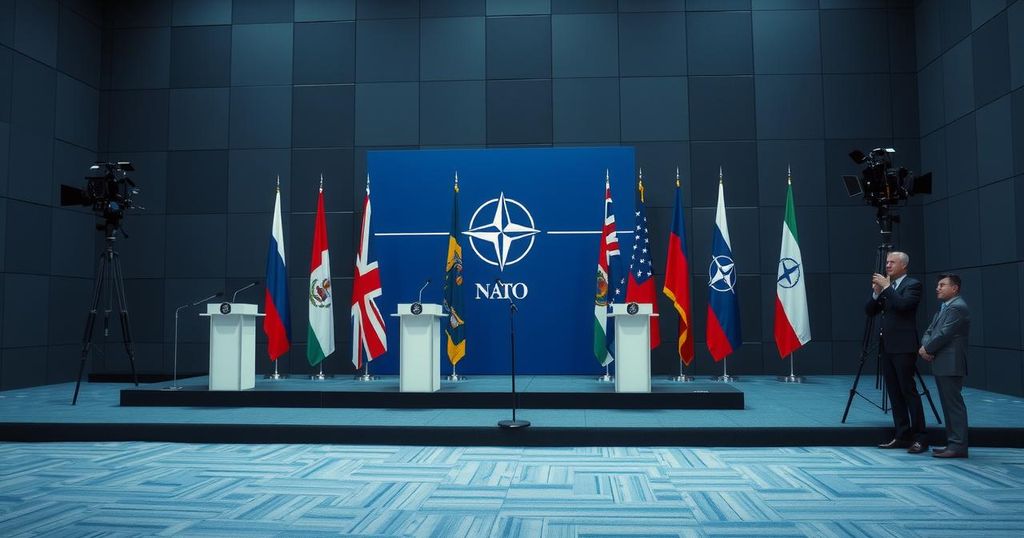Trump Grapples for Upper Hand in Debate Over Damage Caused by US Strikes on Iran

President Trump rebuffs media skepticism over airstrikes on Iran, claiming significant damage was inflicted on its nuclear facilities. While intelligence reports suggest minimal impact, Trump insists the strikes were devastating and asserts that diplomacy with Iran will resume, albeit suggesting agreements may no longer be necessary. The ongoing conflict over intelligence assessments highlights a contentious moment in U.S. foreign policy strategy as officials grapple with the real implications of military actions.
In a heated exchange at the NATO summit in The Hague, U.S. President Donald Trump continued to express frustration over media coverage regarding the effectiveness of recent U.S. airstrikes on Iranian nuclear facilities. Trump openly rejected an intelligence assessment suggesting that the strikes only caused minimal setbacks to Iran’s nuclear capability, insisting that they resulted in significant damage instead. He claimed that the rapid conclusion reached by intelligence personnel did not encompass the full impact of the military action.
President Trump stated emphatically, “This was a devastating attack, and it knocked them for a loop,” as he reaffirmed his prior claims about the thorough destruction caused by the strikes. He further asserted that U.S. military leaders would clarify the operation’s success during a planned news briefing, insisting the bravery of American pilots deserved recognition. His comments were a direct response to reports he labeled as “Fake News,” which suggested a limited impact from the airstrikes.
During this NATO summit, the focus was supposed to be on European security, but Trump’s contentious remarks on the airstrikes took center stage. While the White House pointed to an Israeli statement claiming prolonged delays to Iran’s nuclear efforts, this did little to support Trump’s assertions that the bombings had eradicated the nuclear threat. Secretary of State Marco Rubio stated Iran is now “much further away from a nuclear weapon,” yet his remarks were notably less enthusiastic than Trump’s declarations.
Assessing the actual damage from the strikes remains tricky, just days after they occurred. Experts argue that this uncertainty creates a platform for competing narratives about the strikes’ effectiveness—narratives that could significantly influence public perception ahead of upcoming elections. Professor Jeffrey Lewis highlighted the contradiction in Trump’s statements, noting that if it is too early to know the damage, then claiming total destruction seems misplaced.
Looking ahead, the implications of the strikes on U.S. and Iranian relations are substantial. Trump indicated that talks with Iranian officials would resume soon, despite asserting that negotiations might not be necessary since he believed Iran was too severely damaged to continue its nuclear ambitions. He remarked, “I don’t care if I have an agreement or not,” demonstrating a shift in his approach towards future diplomacy.
Iran, maintaining that its nuclear intentions are purely peaceful, seems determined to continue its program, while U.S. and Israeli officials perceive it as a direct threat. Trump’s complaints about media leaks and intelligence assessments reflect ongoing frustration with perceived bias against his administration. He notably criticized media outlets for their coverage, calling them “scum” and “disgusting.”
The intelligence report, generated by the Defense Intelligence Agency, is typically swift in its preliminary assessments but relies on the available information available at the time. Former officials, like Leon Panetta, caution that full evaluations of the strikes’ impacts will take significant time. CIA Director John Ratcliffe did present that key Iranian nuclear facilities were destroyed, claiming a delay that would take years to rebuild.
Trump defended the military’s actions, arguing that questioning their effectiveness disrespected the personnel involved. He claimed the U.S. operation was swift enough to prevent the movement of enriched uranium out of affected facilities, emphasizing the speed and danger associated with such a transfer. In reaction to leaks about intelligence assessments, the White House plans to limit the sharing of classified documents moving forward, a move expected to face scrutiny from Congress as intelligence briefings for lawmakers have been rescheduled due to these developments.
In summary, this ongoing dialogue surrounding U.S. strikes on Iran fuels a complex relationship marked by conflicting narratives about deterrence, diplomacy, and the overall impact of military decisions. As future talks loom, the fidelity of intelligence assessments will play a crucial role in shaping the narrative and the international response moving forward.
In closing, President Trump’s assertive stance against media coverage of the U.S. airstrikes on Iran’s nuclear program reflects larger tensions around national security narratives. Despite conflicting intelligence assessments, Trump emphasizes the strikes’ significant impact and downplays the need for future negotiations. As diplomatic efforts resume, the dichotomy between stated objectives and on-ground realities will be pivotal in determining the trajectory of U.S.-Iran relations and domestic perceptions of the administration’s military decisions.
Original Source: apnews.com







